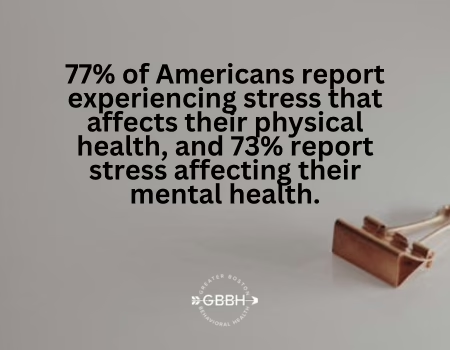As summer fades into fall, the changing season brings cooler weather, shorter days, and often, a busier schedule. While fall can be a time of reflection and new beginnings, it can also bring additional stress. Balancing work, family, holiday planning, and personal responsibilities can become overwhelming, making it essential to focus on self-care and establish habits that promote mental and physical health.
At Greater Boston Behavioral Health (GBBH), we encourage our clients to embrace the changing seasons as an opportunity to reset and develop healthier routines. By incorporating effective stress-management techniques and participating in supportive services like our Anxiety Treatment Programs or Group Therapy Programs, individuals can reduce stress, enhance resilience, and maintain a sense of balance throughout the season.
Why Fall Is the Perfect Time to Focus on Healthy Habits
The transition to fall provides a natural opportunity to reevaluate your routines and mental well-being. The season’s slower pace and cozy atmosphere encourage self-reflection and mindfulness, making it an ideal time to adopt positive changes. However, the shift to shorter days and increased responsibilities can also contribute to higher stress levels.
The Link Between Fall and Stress
- Seasonal Affective Disorder (SAD): Reduced daylight can affect mood and energy levels, contributing to seasonal depression.
- Increased Responsibilities: Back-to-school schedules, holiday planning, and work commitments can feel overwhelming.
- Social Pressures: Fall gatherings and events can strain social connections, especially if there are unresolved conflicts or expectations.
By proactively incorporating stress-relief practices into your daily life, you can mitigate these challenges and improve your overall well-being.
How Stress Impacts Your Health
Chronic stress doesn’t just affect your mood—it has far-reaching consequences for your physical and mental health. Understanding its effects underscores the importance of adopting habits that promote relaxation and balance.
Physical Effects of Stress
- Increased blood pressure, raising the risk of cardiovascular issues.
- Muscle tension, leading to chronic pain or headaches.
- Weakened immune system, making you more susceptible to illness.
- Sleep disturbances, such as insomnia or restless nights.
Mental Effects of Stress
- Heightened anxiety and worry, often requiring professional support like our Anxiety Treatment Programs.
- Emotional exhaustion and irritability, which may lead to the need for an Anger Management Program.
- Feelings of sadness or hopelessness, which can develop into depression.
- Difficulty concentrating and making decisions, affecting productivity and relationships.
Fall Habits to Reduce Stress and Enhance Well-Being
Adopting healthy habits during the fall can help you build resilience and maintain a positive outlook. Here are actionable steps to combat stress effectively:
1. Prioritize Quality Sleep
Fall’s longer nights make it the perfect time to reset your sleep schedule. Adequate rest is essential for mental clarity, emotional regulation, and physical recovery.
Tips for Better Sleep:
- Establish a consistent bedtime routine, even on weekends.
- Create a relaxing pre-sleep ritual, such as reading or meditating.
- Limit caffeine and screen time in the evening to improve sleep quality.
At GBBH, we emphasize the importance of sleep hygiene in our Depression Treatment Program, as sleep disruptions are often linked to mood disorders.
2. Engage in Outdoor Activities
Take advantage of the crisp autumn weather by spending time outdoors. Nature has been shown to reduce stress hormones and improve mood.
Ideas for Outdoor Activities:
- Take a walk through a park or hiking trail to enjoy the foliage.
- Visit a local orchard for apple picking or a pumpkin patch.
- Practice mindfulness outdoors by observing the sounds, colors, and smells of fall.
Outdoor activities can complement therapies offered in our Trauma Therapy Programs, providing grounding experiences that reduce emotional distress.
3. Incorporate Seasonal Nutrition
Fall offers a bounty of seasonal produce rich in nutrients that support brain health and stress reduction.
Healthy Eating Tips:
- Include seasonal fruits and vegetables like squash, sweet potatoes, and apples in your meals.
- Opt for whole grains and lean proteins to stabilize energy levels.
- Stay hydrated, as dehydration can exacerbate stress and fatigue.
Nutritional counseling is often integrated into our Partial Hospitalization Programs (PHP) to support holistic recovery.
4. Stay Active
Regular physical activity boosts endorphins, improves energy levels, and reduces stress. Fall’s cooler weather makes it easier to engage in outdoor or indoor workouts.
Ways to Stay Active:
- Rake leaves or garden for a productive and physical activity.
- Join a local gym or yoga class to stay consistent with fitness goals.
- Practice stretching or Pilates to relieve muscle tension.
Exercise is a vital component of our Intensive Outpatient Programs (IOP), helping clients maintain physical and mental health.
5. Practice Mindfulness and Relaxation Techniques
Mindfulness helps manage stress by focusing on the present moment and reducing overthinking. Incorporating mindfulness into your daily routine can foster a sense of calm and control.
Mindfulness Practices:
- Start your day with 5–10 minutes of deep breathing exercises.
- Keep a gratitude journal to reflect on positive aspects of your day.
- Use guided meditation apps to relax before bed.
Mindfulness-based approaches are central to our Mental Therapy Programs, helping individuals manage anxiety and emotional triggers.
6. Strengthen Social Connections
Fall’s focus on gatherings and togetherness provides an opportunity to reconnect with loved ones and build supportive relationships.
Ways to Connect:
- Plan family outings like movie nights or pumpkin carving.
- Host a potluck or bonfire to bring friends together.
- Join a Family Therapy Program to address unresolved conflicts and improve communication.
At GBBH, our Group Therapy Programs foster peer support and help individuals realize they’re not alone in their struggles.
7. Set Healthy Boundaries
The demands of fall and the approaching holiday season can quickly lead to burnout. Learning to set boundaries is essential for maintaining balance.
Tips for Setting Boundaries:
- Say no to unnecessary commitments that don’t align with your priorities.
- Communicate your limits with friends, family, and colleagues.
- Delegate tasks to reduce your workload and stress levels.
Boundary-setting is a skill we emphasize in our Anger Management Programs, helping clients prioritize self-care without guilt.
8. Seek Professional Support When Needed
If stress becomes overwhelming, seeking professional help is a proactive step toward improving mental health. Therapy provides tools and guidance for managing stress effectively.
At GBBH, we offer a range of tailored programs, including:
- Anxiety Treatment Programs for managing chronic worry and stress.
- Depression Treatment Programs to address stress-related mood disorders.
- Trauma Therapy Programs for individuals coping with past traumatic experiences.
The Benefits of Healthy Fall Habits
By adopting healthy habits this fall, you can experience significant improvements in your mental and physical health:
- Reduced Stress Levels: Lower cortisol levels and improved emotional regulation.
- Enhanced Mental Health: Better management of anxiety and depression symptoms.
- Improved Physical Health: Increased energy, better sleep, and a stronger immune system.
- Stronger Relationships: Deepened connections with loved ones and improved communication.
- Greater Resilience: The ability to cope with future stressors more effectively.
Why Choose Greater Boston Behavioral Health?
At Greater Boston Behavioral Health, we are committed to providing holistic, evidence-based care to help individuals combat stress and achieve lasting wellness. Here’s why clients trust us:
- Experienced Team: Our licensed therapists specialize in addressing stress, anxiety, depression, and trauma.
- Comprehensive Programs: From Mental Health Programs to Group Therapy Programs, we offer a wide range of services tailored to individual needs.
- Flexible Options: Our PHP, IOP, and outpatient services provide the right level of support for every stage of recovery.
- Accessible Location: As a trusted Mental Health Treatment Center in Boston, we serve clients throughout the region with compassionate, high-quality care.
Take the First Step Toward a Stress-Free Fall
Stress doesn’t have to control your life. By adopting healthy habits and seeking support when needed, you can navigate the challenges of fall with confidence and ease. At Greater Boston Behavioral Health, we’re here to guide you on your journey to better mental health.
Contact us today at (888)278-0716 to learn more about our services, including Anxiety Treatment Programs, Family Therapy Programs, and Trauma Therapy Programs. Let us help you build a foundation for a healthier, more balanced life this fall.
FAQ on Healthy Habits to Combat Stress in the Fall
Why is fall a good time to focus on stress management?
Fall offers a natural reset with its slower pace, encouraging reflection, mindfulness, and the opportunity to establish healthy routines.
How does stress affect mental and physical health?
Chronic stress can lead to anxiety, depression, sleep disturbances, weakened immunity, and even cardiovascular problems.
What are some effective ways to manage stress during fall?
Practices like prioritizing sleep, outdoor activities, healthy eating, mindfulness, setting boundaries, and staying socially connected can significantly reduce stress.
Can therapy help with stress management?
Yes, therapy provides tools to address the root causes of stress and improve coping mechanisms. Programs like Anxiety Treatment Programs and Trauma Therapy Programs are particularly effective.
How can GBBH help with stress management?
At Greater Boston Behavioral Health, we offer a range of services, including Mental Health Programs, Group Therapy Programs, and Intensive Outpatient Programs (IOP), to help individuals develop healthy habits and manage stress effectively.
What role do social connections play in managing stress?
Strong social support reduces feelings of isolation and provides emotional encouragement, making relationships a key component of stress management.


